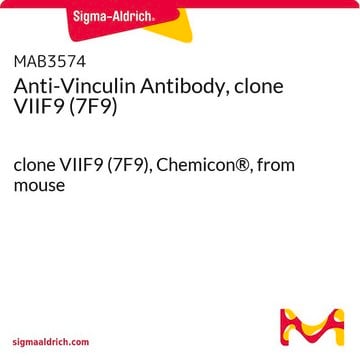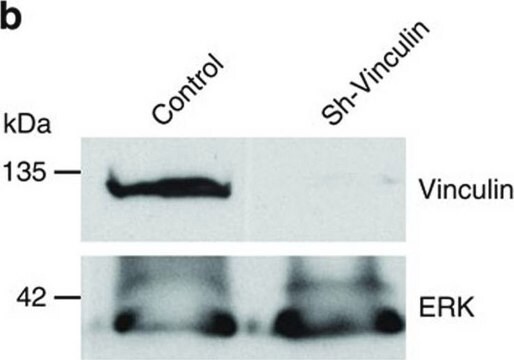F7053
Anti-Vinculin−FITC antibody, Mouse monoclonal
clone hVIN-1, purified from hybridoma cell culture
Synonym(s):
Monoclonal Anti-Vinculin antibody produced in mouse
About This Item
Recommended Products
biological source
mouse
conjugate
FITC conjugate
antibody form
purified immunoglobulin
antibody product type
primary antibodies
clone
hVIN-1, monoclonal
form
buffered aqueous solution
mol wt
antigen 116 kDa
species reactivity
frog, chicken, mouse, canine, human, bovine, rat, turkey
storage condition
protect from light
technique(s)
direct immunofluorescence: 1:50 using methanol/acetone fixed cultured bovine MDBK cells
isotype
IgG1
UniProt accession no.
shipped in
dry ice
storage temp.
−20°C
target post-translational modification
unmodified
Gene Information
human ... VCL(7414)
mouse ... Vcl(22330)
rat ... Vcl(305679)
Looking for similar products? Visit Product Comparison Guide
Related Categories
Specificity
Immunogen
Application
Biochem/physiol Actions
Physical form
Disclaimer
Not finding the right product?
Try our Product Selector Tool.
related product
Storage Class Code
12 - Non Combustible Liquids
WGK
nwg
Flash Point(F)
Not applicable
Flash Point(C)
Not applicable
Regulatory Listings
Regulatory Listings are mainly provided for chemical products. Only limited information can be provided here for non-chemical products. No entry means none of the components are listed. It is the user’s obligation to ensure the safe and legal use of the product.
JAN Code
F7053-200UL:
F7053-VAR:
F7053-BULK:
Certificates of Analysis (COA)
Search for Certificates of Analysis (COA) by entering the products Lot/Batch Number. Lot and Batch Numbers can be found on a product’s label following the words ‘Lot’ or ‘Batch’.
Already Own This Product?
Find documentation for the products that you have recently purchased in the Document Library.
Customers Also Viewed
Our team of scientists has experience in all areas of research including Life Science, Material Science, Chemical Synthesis, Chromatography, Analytical and many others.
Contact Technical Service
















